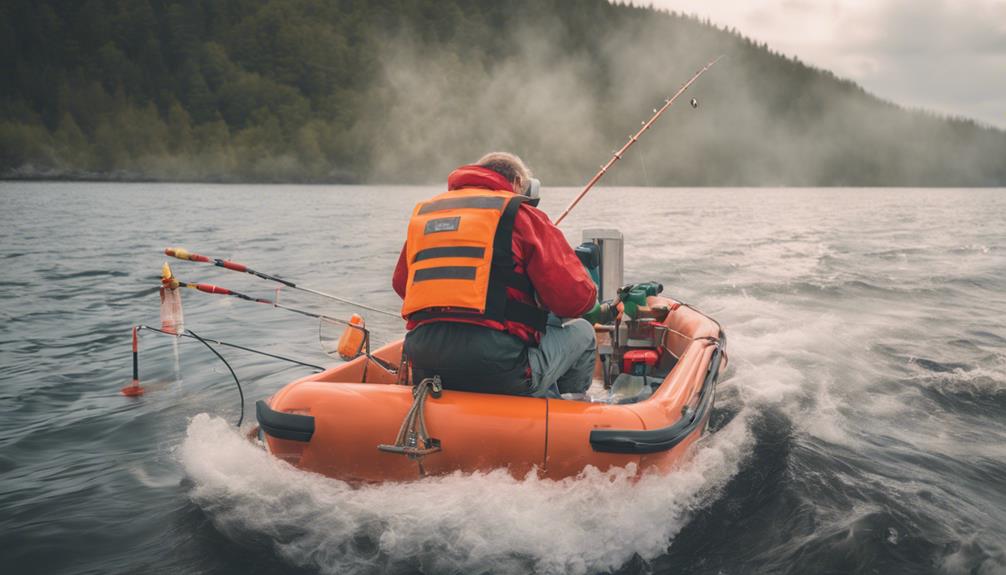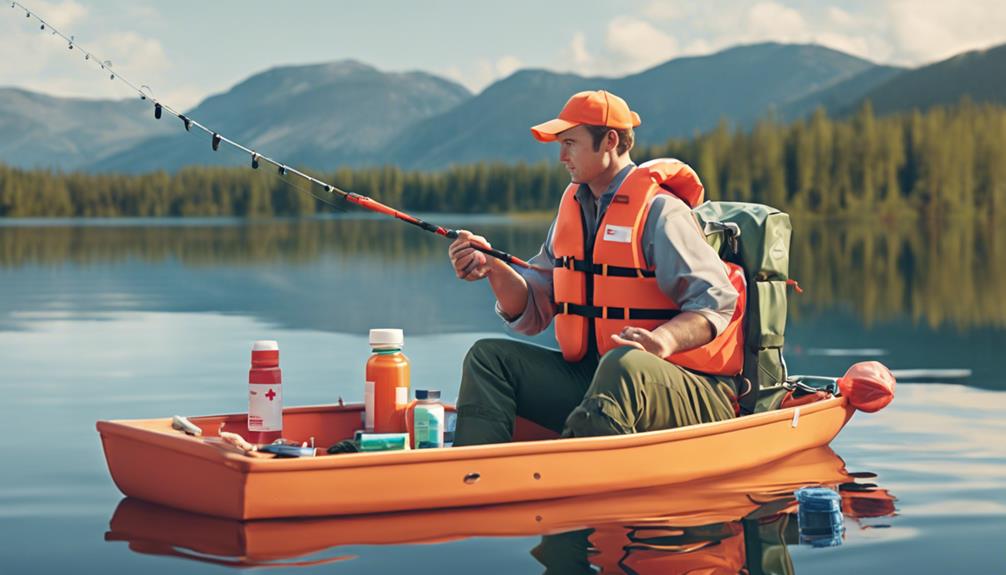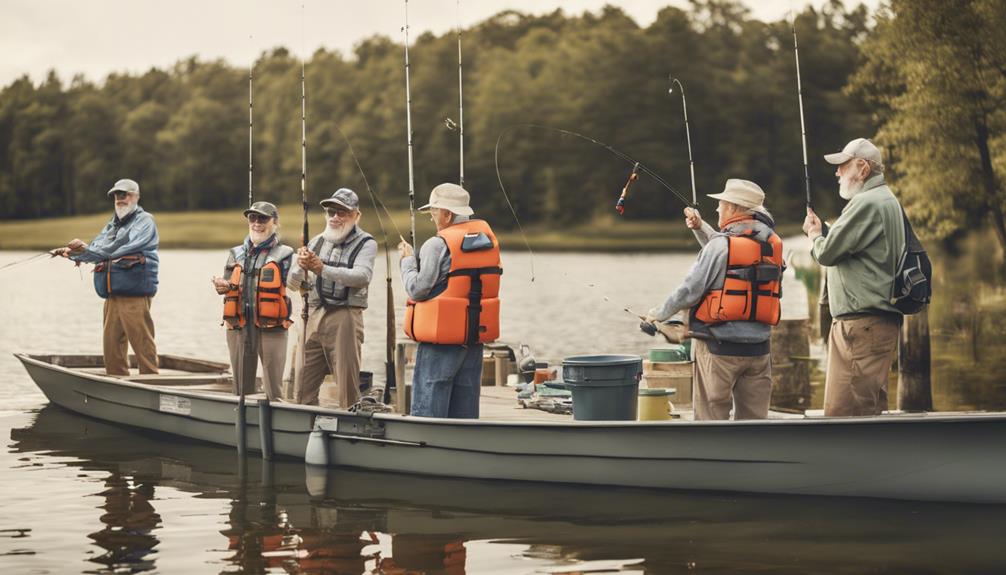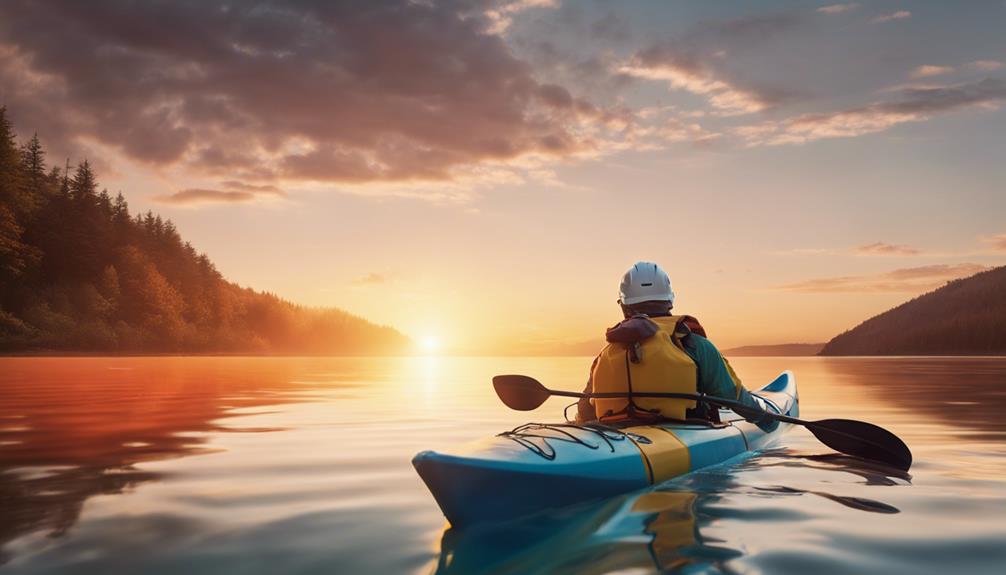When it comes to navigating the waters of safety on your fishing expeditions, think of yourself as the captain of a sturdy ship, charting a course through potential hazards.
From donning the right safety gear to staying abreast of changing weather patterns, each step plays a vital role in ensuring a smooth and secure journey.
As you prepare to cast your line into the unknown, keep in mind the critical elements that safeguard not just your catch but also your well-being.
Importance of Safety Gear
Why is having the right safety gear essential for your fishing trip?
Safety gear is crucial to ensure your well-being while out on the water. Before embarking on any fishing adventure, it's vital to have a thorough safety equipment checklist. This checklist should include items such as life jackets, first aid kits, a whistle, a flashlight, and a fully charged cell phone or marine radio. These items can make a significant difference in case of an emergency.
Emergency response training is another critical aspect to consider. Knowing how to react in various emergency situations can save lives. Take the time to familiarize yourself with basic first aid procedures, CPR, and how to use the safety equipment on board. Many organizations offer courses specifically tailored to boating emergencies, so consider enrolling in one to enhance your skills.
Checking Weather Conditions
When planning your fishing trip, ensure to check the weather conditions beforehand to stay informed and prepared for any potential challenges. Weather awareness is crucial for a safe and enjoyable fishing experience. Start by checking the forecast using reliable sources such as the local weather service or reputable weather apps. Look out for any alerts or warnings that may affect your trip.
Equipment preparation is key when considering the weather. If there's a chance of rain, make sure to pack waterproof gear such as jackets, pants, and covers for your equipment. Additionally, having extra layers in case of temperature drops is essential for your comfort and safety. High winds can also pose a danger, especially if you're on a boat, so be sure to secure loose items and consider whether it's safe to proceed with your plans.
Keep an eye on the weather throughout your trip, as conditions can change rapidly. If you notice dark clouds, sudden temperature shifts, or increasing wind speeds, it may be wise to head back to shore or find a safe spot to wait out the weather. Always prioritize your safety and that of your fellow anglers by staying vigilant and adaptable to the changing weather conditions.
Understanding Local Regulations
Ensure you familiarize yourself with the local regulations before embarking on your fishing trip to ensure compliance and a smooth experience. Understanding and following the rules in place not only help protect the environment but also contribute to the sustainability of fishing resources. Here are some key points to consider:
- Conservation Efforts: Respect any designated conservation areas and practice catch-and-release techniques where necessary to help maintain healthy fish populations.
- Fishing Etiquette: Be mindful of other anglers and wildlife around you. Keep noise levels down, properly dispose of any trash, and always follow proper fishing etiquette to promote a positive fishing community.
- Environmental Impact: Understand how your fishing practices can impact the environment. Avoid disrupting sensitive habitats, such as coral reefs or seagrass beds, and use environmentally friendly gear whenever possible.
- Catch Limits: Be aware of the regulations regarding the size and number of fish you can catch. Adhering to catch limits helps prevent overfishing and ensures a sustainable fishery for future generations.
- Local Regulations: Familiarize yourself with any specific rules or restrictions in the area you plan to fish. This includes licensing requirements, restricted fishing zones, and any seasonal closures to avoid any legal issues during your trip.
Proper Boat Maintenance
To maintain the safety and efficiency of your boat, regular maintenance is essential. Boat cleaning should be done after each fishing trip to prevent the buildup of debris and salt that can corrode the hull. Use mild soap and water to clean the exterior of the boat, making sure to rinse thoroughly. For the interior, vacuum any dirt or sand, wipe down surfaces, and clean any fish blood or bait remnants to avoid odors and deterioration.
Proper equipment storage is also crucial for boat maintenance. Storing fishing gear in designated compartments or containers helps prevent clutter that can lead to accidents. Make sure all gear is properly secured to avoid items shifting during navigation. When storing fishing rods, remove reels and store them vertically to prevent warping. Additionally, regularly inspect ropes, anchors, and safety equipment to ensure they're in good condition and easily accessible in case of emergencies.
First Aid Kit Essentials
Keeping a well-stocked first aid kit on your boat is essential for handling any potential injuries or emergencies while out on the water. In case of accidents or unexpected situations, having the necessary supplies readily available can make a significant difference in the outcome. Here are five crucial items to include in your first aid kit:
- Adhesive bandages: These are essential for minor cuts and scrapes that may occur during your fishing trip. Keeping wounds clean and covered is crucial for preventing infections.
- Sterile gauze pads: These are necessary for larger wounds that require more substantial coverage and protection. Proper wound care can help prevent complications and promote faster healing.
- Antiseptic wipes: Cleaning wounds before applying any dressings is vital to prevent infections. Antiseptic wipes help disinfect the area and reduce the risk of complications.
- Tweezers: In case of splinters, thorns, or insect stings, having tweezers on hand can help safely remove foreign objects from the skin.
- First aid manual: Even with basic first aid knowledge, a first aid manual can provide guidance on more complex situations. However, remember that nothing can substitute proper first aid and CPR training.
Emergency Communication Devices
During your fishing trip, having reliable emergency communication devices onboard is crucial for ensuring quick response in case of emergencies. Two essential devices to consider bringing along are satellite phones and GPS trackers.
Satellite phones are valuable because they can operate in remote areas where regular cell phones may not have coverage. In case of an emergency, being able to contact emergency services or your designated emergency contacts can make a significant difference in ensuring a swift rescue operation. Make sure the satellite phone is fully charged and stored in a waterproof container to protect it from water damage.
GPS trackers are another essential tool to have on board. These devices can help rescuers locate you quickly in case you're lost or in distress. Some trackers also come with additional features like sending out distress signals or allowing you to share your location with others. Familiarize yourself with how to use the GPS tracker before setting out on your fishing trip to ensure you can make the most out of its functionalities during an emergency situation.
Fishing With a Buddy System
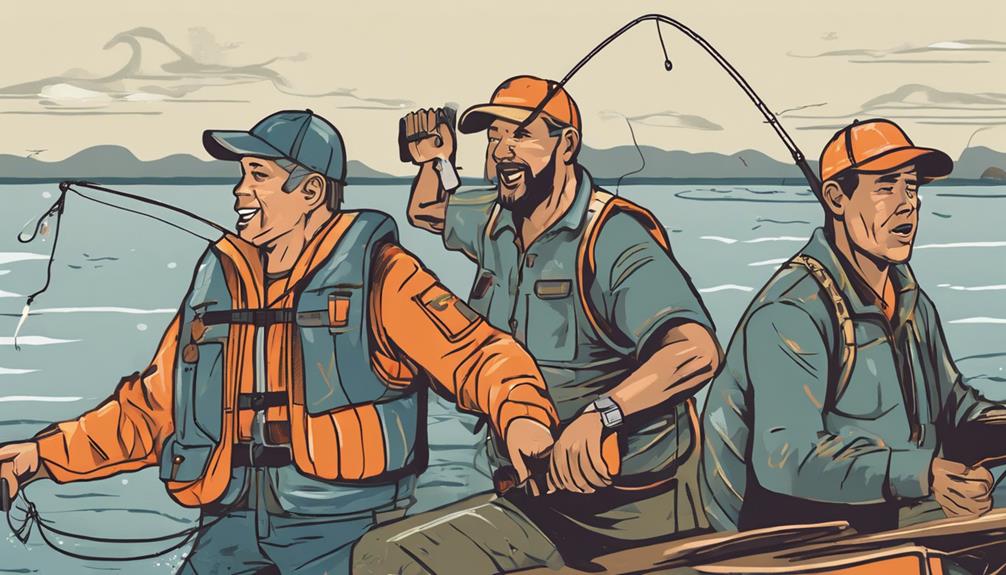
Ensure your safety and enhance the fishing experience by implementing a buddy system during your fishing trip. Fishing with a buddy can significantly improve your overall safety on the water. The buddy system effectiveness lies in the teamwork dynamics between you and your fishing partner.
- Peace of Mind: Knowing someone has your back while you navigate waters brings a sense of security and comfort.
- Quick Assistance: In case of emergencies or accidents, having a buddy nearby ensures prompt help.
- Shared Knowledge: Two heads are better than one when it comes to problem-solving or decision-making during the trip.
- Celebrate Success: Catching a big fish or reeling in a challenging catch is more enjoyable when shared with a buddy.
- Building Bonds: Spending quality time with a friend or family member strengthens relationships and creates lasting memories.
Working together with your fishing buddy not only makes the trip safer but also amplifies the fun and enjoyment. Teamwork dynamics play a crucial role in ensuring that both you and your buddy have a successful and safe fishing expedition. So, next time you plan a fishing trip, consider the buddy system to make the experience even more rewarding.
Safe Handling of Fishing Equipment
When handling your fishing equipment, always be mindful of safety guidelines to prevent accidents and ensure a smooth fishing experience. Proper maintenance and equipment care are crucial aspects of ensuring your gear is safe to use and functions properly. Before heading out on your fishing trip, take the time to inspect all your equipment to make sure everything is in good condition.
Start by checking your fishing rods for any signs of damage, such as cracks or weak spots. Ensure that the reel is functioning smoothly and that the line isn't frayed. It's also essential to inspect your hooks for rust or dullness, as sharp hooks are safer and increase your chances of a successful catch.
When handling sharp objects like hooks or knives, always do so with caution to prevent accidental injuries. Properly store your equipment when not in use to avoid tripping hazards or damage. Additionally, make sure to clean your gear after each trip to prevent corrosion and extend its lifespan.
Frequently Asked Questions
How Can I Prevent Seasickness While on a Fishing Trip?
To prevent seasickness on a fishing trip, try some anti-nausea remedies like ginger or over-the-counter medications. Motion sickness bands can also be helpful. Stay hydrated and avoid heavy meals before setting sail.
Choose a spot on the boat with less motion, like the middle. Focus on the horizon to help stabilize your inner ear. If all else fails, consult a doctor for stronger remedies.
What Should I Do in Case of a Medical Emergency While Out at Sea?
In case of a medical emergency while out at sea, remember to stay calm and assess the situation first. Quick emergency response is crucial.
If someone is injured or falls ill, apply basic first aid procedures like stopping bleeding, stabilizing injuries, and providing CPR if necessary. Have a well-equipped first aid kit on board and know how to use it.
Always prioritize safety and be prepared for any unforeseen situations during your fishing trips.
Are There Any Specific Safety Tips for Fishing at Night?
When night fishing, you should follow specific strategies to enhance your experience and safety. Using proper lighting and staying aware of your surroundings are crucial.
Make sure you have safety equipment essentials like a flashlight, life jacket, and first aid kit. It's essential to be prepared for any situation that may arise while enjoying the peacefulness of fishing at night.
How Can I Properly Secure My Fishing Gear to Prevent Accidents on the Boat?
To properly secure your fishing gear on the boat, focus on gear organization and storage techniques. Ensure your equipment is safely stowed away to prevent accidents.
Regularly check the condition of your gear and perform safety checks before setting out on your fishing trip. By maintaining your equipment and securing it properly, you can help prevent any mishaps and enjoy a safer fishing experience on the water.
What Steps Should I Take to Ensure the Safety of Children or Inexperienced Anglers on Board?
To ensure the safety of children or inexperienced anglers on board, prioritize child supervision and establish clear safety protocols. Make sure kids wear life jackets and are always within sight.
For inexperienced anglers, teach them basic fishing techniques and emergency procedures. Stay vigilant and ready to assist if needed.
Conclusion
Make sure to prioritize safety on your fishing trips by always wearing proper safety gear, checking weather conditions, following local regulations, maintaining your boat, having a first aid kit on board, carrying emergency communication devices, fishing with a buddy system, and handling fishing equipment carefully.
By taking these precautions, you can ensure a safe and enjoyable fishing experience every time.
Stay safe out on the water!
